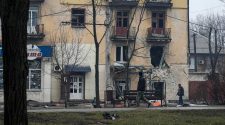Armenia and Azerbaijan have agreed to a ceasefire starting on Saturday to exchange prisoners and bodies of those killed in the conflict between Azeri and ethnic Armenian forces over the Nagorno-Karabakh region, Russia’s foreign minister, Sergei Lavrov, said.
The talks between the two sides were held in Moscow and were the first diplomatic contact between the enemies since fighting over the breakaway enclave erupted on 27 September, killing hundreds of people. The ceasefire begins at 12pm local time (0800GMT).
Lavrov, who mediated the negotiations in Moscow, announced the ceasefire after 10 hours of talks with his Armenian and Azeri counterparts. He also said Armenia and Azerbaijan agreed to start talks on the settlement of the conflict.
During the ceasefire – mediated by the International Committee of the Red Cross – the parties will exchange dead bodies and prisoners, Lavrov said, reading from a statement.
“Concrete parameters of the ceasefire will be agreed separately,” the statement said.
Russia’s top diplomat also said that Armenia and Azerbaijan agreed to start seeking a lasting solution to the territorial dispute.
“Azerbaijan and Armenia begin substantive negotiations with the purpose of achieving a peaceful settlement as soon as possible,” Lavrov told reporters, adding that such talks will be mediated by the Organization for Security and Co-operation in Europe’s (OSCE) Minsk Group of international negotiators.
Armenia’s foreign minister, Zohrab Mnatsakanyan, and his Azeri counterpart, Jeyhun Bayramov, did not speak to reporters.
The mountain enclave belongs to Azerbaijan under international law but broke away in a war as the Soviet Union collapsed and is populated and governed by ethnic Armenians.
The renewed fighting in the decades-old conflict has raised fears of a wider war drawing in Turkey, a close ally of Azerbaijan, and Russia, which has a defence pact with Armenia.
The clashes have also increased concern about the security of pipelines that carry Azeri oil and gas to Europe.
The fighting was the worst since a 1991-94 war that killed about 30,000 people and ended with a ceasefire that has been violated repeatedly. Both sides accused each other of targeting residential areas and civilian infrastructure.
Early on Sunday 27 September, Armenia announced it was declaring martial law, mobilising its army and ordering civilians to shelter. It claimed its neighbour Azerbaijan had launched a military operation inside a breakaway region called Nagorno-Karabakh. Azerbaijan said it attacked only in response to Armenian shelling.
Nagorno-Karabakh is recognised internationally as Azerbaijan’s territory but has a mostly Armenian population who have resisted Azerbaijani rule for more than a century. In 1991 the region of around 150,000 people declared independence and since then it has ruled itself – with Armenian support – as the unrecognised Republic of Artsakh.
Nagorno-Karabakh, a mountainous, landlocked region inside the borders of Azerbaijan, has been a source of dispute since before the creation of the Soviet Union. Tensions were suppressed when both Armenia and Azerbaijan were Soviet states, but they re-emerged as the cold war ended and Communist party control of the bloc dissolved.
A war between Armenian and Azerbaijani forces ended in a ceasefire in 1994, with Armenia in full control of Nagorno-Karabakh and other surrounding enclaves of Azerbaijan’s territory. Azerbaijan is majority Muslim and Armenia is majority Christian, and some elements on both sides seek to cast the conflict in religious terms.
Michael Safi
Azerbaijan said on Friday that 31 Azeri civilians had been killed and 168 wounded since 27 September. It has not disclosed information about military casualties.
Nagorno-Karabakh said 376 of its military personnel and 22 civilians had been killed since the beginning of the conflict.
Stepanakert, the capital of Nagorno-Karabakh, had been under intense shelling. Residents were staying in shelters, some of which were in the basements of apartment buildings.
Armenian officials alleged that Turkey was involved in the conflict and is sending Syrian mercenaries to fight on Azerbaijan’s side. Turkey has publicly backed Azerbaijan in the conflict but has denied sending fighters to the region.
Turkey said on Friday that efforts by France, the US and Russia to end violence between Azeri and Armenian forces over Nagorno-Karabakh were bound to fail unless they ensured a withdrawal of Armenian forces from the enclave.
















